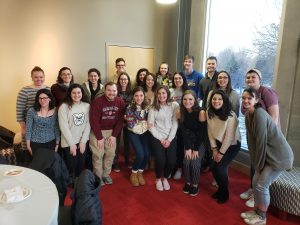Greening Indiana: Theologies and Ethics of Sustainability
Students and Speakers at the Pre-Seminar Supper
Last week the Butler Seminar on Religion and Global Affairs on the topic of Sacred Places: Intersections of Religion and Ecology, held its final session, titled “Greening Indiana: Theologies and Ethics of Sustainability.” For the past year we have approached the work of ecojustice from a number of religious perspectives – Christian, Jewish, Buddhist, Jain, and Hindu – and methodological angles – sociology, biology, film, literature, politics, economics, philosophy, and theology, among many others. In this last session, we trained our focus on local efforts toward sustainability and ecojustice right here in Indiana, with the guidance of three fantastic speakers: Lisa Sideris, Dori Chandler, and Jessica Davis.
Lisa Sideris is Professor of Religious Studies at Indiana University in Bloomington and her research and teaching focuses on intersections of religion, science, and ecology. Dr. Sideris emphasized the need for a “public theological conversation” in which multiple perspectives (religious and secular) are welcomed in order to expand our vision of the health and wellbeing of the planet and what we can do in our local communities to address the environmental crisis. Dr. Sideris invited us to consider how our roots in a particular place and community have shaped who we have become; these roots provide our entrée into the work of ecojustice. However, as a culture we have a collective case of “environmental amnesia,” as each generation becomes accustomed to the status quo as “normal,” despite the environmental devastation we observe all around us. Paying attention to the history of our places and the changes that have occurred over the generations reminds us that human activity sometimes drastically alters a place and its ecology, compelling us to marshal every resource available to us – scientific, political, economic, social, historical, and religious – to address the environmental crisis, which is the defining issue of our time.
Dori Chandler is a board member of Hoosier Interfaith Power and Light, a member of the Citizens’ Climate Lobby, and Director of Interfaith Programming and Advisor of Hillel at the Butler Center for Faith and Vocation. Dori draws inspiration from the rabbinic notions of tikkun olam (“repairing the world”) and bal tashchit (“do not destroy”) to inform her environmental activism. Together with Dr. Sideris, Dori shared some startling statistics about the environmental crisis here in Indiana: Indiana ranks #46 in air quality in the US, #48 in overall quality of life, and #1 in the number of coal ash ponds and super-polluting power plants. Dori’s work with the Citizens’ Climate Lobby and Hoosier Interfaith Power and Light brings together Hoosiers of diverse backgrounds and religious and ethical commitments to lobby for legislation to address these environmental problems and to forge a new path toward sustainability and ecojustice in Indiana and beyond. Almost 80% of Hoosiers identify as religious, which means that any substantial change of course must include religious voices in order to be effective. HIPL is on the front lines of organizing religious communities to make the connections between religious faith and environmental activism, with inspiring results.
The last speaker was Jessica Davis, Director of Sustainability at Indiana University-Purdue University Indianapolis. Jessica works with students, faculty, staff, administrators, and community partners to adopt and implement sustainable practices on the IUPUI campus and in Indianapolis. For example, IUPUI is a certified “bee campus” and “tree campus,” has seven LEED-certified buildings (and is constructing three more), has a student-run effort to combat food waste that in one year salvaged 30,000 pounds of food, and recently hosted the first Olympic trial in history that produced zero waste. IUPUI is doing good and important work on sustainability and is training its students to be environmentally-conscious citizens. In her talk Jessica took time to define some common terms for the audience. She defined sustainability as meeting the needs (not wants) of the current generation while at the same time allowing future generations to meet their needs as well. She further suggested that the key to successful sustainability efforts is meeting three related needs: successful sustainability efforts will be environmentally-friendly, socially just, and economically feasible. Her work at IUPUI embraces each of these goals with impressive results that are an inspiration to other institutions in the region.
The environmental crisis is urgent and it is doing real and lasting damage, here and now. We are in the midst of an existential crisis that will require drastic measures to address. In this session we were invited to find hope, empowerment, and energy for the work that lies before us. There is good and important work being done here in central Indiana in myriad ways, large and small, to address the environmental crisis and to create a better, more sustainable, more just future for us all.
The full video of the lectures and the Q&A with the audience is available here:
Brent Hege
CFV Scholar in Residence and Lecturer in Religion

7 thoughts on “Greening Indiana: Theologies and Ethics of Sustainability”
555
555
555
555
555
I gave cornbread thc gummies a prove for the first adjust, and I’m amazed! They tasted great and provided a intelligibility of calmness and relaxation. My importance melted away, and I slept outstrip too. These gummies are a game-changer an eye to me, and I highly endorse them to anyone seeking appropriate emphasis liberation and think twice sleep.
Thanks for this fascinating, thorough update. I have enjoyed these series so very much!